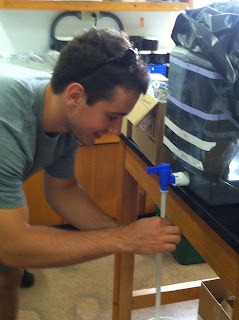Hi everyone! My name is Harrison and I stayed at BIOS doing research on the chemistry of tar as part of the Research Experience for Undergraduates funded by the National Science Foundation.
 |
| Your author at work! |
The natural history of the island of Bermuda is highly accessible. As part of our tenure at the Bermuda Institute of Ocean Sciences (BIOS), we interns partook in a romp through Walsingham—one of Bermuda’s many parks—with Field Conservation Officer Robert Chandler. Mr. Chandler enthralled us, fluidly explaining the many natural and unnatural features we observed on our walk. We stood in a gigantic natural sink-hole, staring at the beautiful curtain rock exposed when its carbonaceous housing collapsed. Innately knowing our un-vocalized questions about the origin of this dramatic geological feature, Mr. Chandler delved into the introduction of a myriad of non-native plants to Bermuda that forever changed the island’s soil chemistry. As a student of chemistry, I latched onto this particular fact. I felt a sense of awe; here was chemistry at work over the course of hundreds of years. Later in the tour, we had a chance to swim in a flooded cave—certainly another unique experience where the alkaline conditions of the pool’s water is said to leave your skin feeling strange and rubbery, like that of a shark. None of us felt shark-like in the least, but swimming in the cave was at once both haunting and exhilarating.
 |
| The cave pools of Walsingham, Bermuda |
Our
experience with Bermuda’s natural features and vegetation extended beyond our
guided tour at Walsingham. The BIOS campus is home to many edible plants. I
have had a chance to sample coconuts and bananas grown feet from our front
door, and I have heard tantalizing rumors of an avocado tree as well. Fig trees
also grow in abundance. The presence of edibles and easily-recognizable facets
of Bermuda’s natural history is at least in part responsible for the dynamic
relationship we cultivated with the environment during our stay on the island.
 |
| The view from my room! |
During the last three months, I have had the pleasure to be involved in a number of trips and activities through BIOS that have deepened my appreciation for studying the environment. I have gone sampling on the Research Vessel Atlantic Explorer with the Bermuda Atlantic Time-series Study crew. What could be more fantastic than having your office in the middle of the ocean, and launching instruments to the lightless depths of the ocean, and taking breaks on deck in the sun.
 | ||
| Left to right: Mentor Ruth Curry with REU students Amy, Ryan, Kelsey, and Ameena watching sampling late at night on the R/V Atlantic Explorer. |
Back on land, I helped in the station-wide effort to clean anthropogenic debris from Whalebone Bay. I also walked most of the verdant and—more-often-than-not—stunning portions of the Bermuda railway trail. And even further, I have met some of the station’s trustees, and besides the excellent conversations, gleaned insightful tidbits about how their careers have brought them to be a part of BIOS.
 |
| Amy and Derek on our 15 mile walk on the Bermuda railway trail. |
I
could not recommend my experience at BIOS more. I sincerely hope that next Fall
sees another group of interns that have a similar, remarkable experience.
The REU program at BIOS is supported by the National Science Foundation's Division of Ocean Sciences under Grant No. 1262880.




































